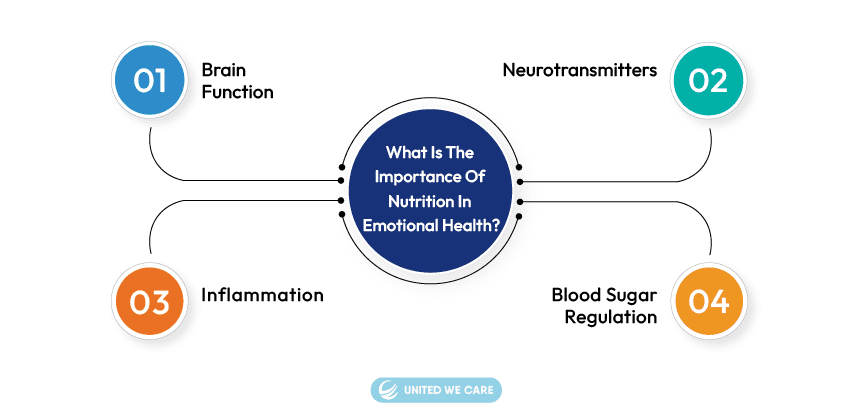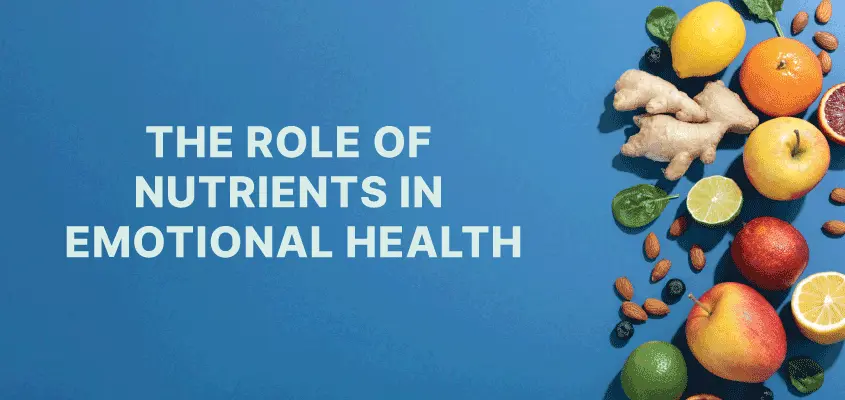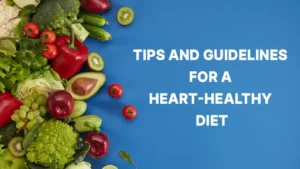Introduction
since childhood, I was told, “You are what you eat.” This is because what we eat builds our emotional and physical health. All our organs, and mainly our brain, work better if we have a habit of eating a nutritious and healthy diet. But, if you are wondering what nutrients are and how they help us in managing our emotions, then let me help you understand this connection through this article. Let’s discuss which nutrients are specifically necessary in dealing with your emotions in a better manner, and you can go and add them all to your diet.>
“What most people don’t realize is that food is not just calories; it’s information. It actually contains messages that connect to every cell in the body.” – Dr. Mark Hyman [1]
What are Nutrients?
Let’s be honest. We all like to indulge in a little unhealthy food at some time, isn’t it? Growing up, my mom had to force me to eat healthy because I loved eating junk food all the time. She would always tell me that I should eat healthy and not have junk food like chips, french fries, chocolates, etc. When I would ask her what healthy food meant, she would give me fruits, leafy vegetables, baked fish, grilled chicken, etc. Then, I would sit in front of the television watching Popeye, The Sailorman, and see him eat spinach. All these helped me understand how important it is to eat healthy.
The major components that we get from the food we eat are the ‘Nutrients.’ These substances help our bodies to function properly so that we can build and maintain good health. Did you know that it is because of certain nutrients that our cells and tissues grow and repair themselves in a proper manner? That way, all the systems and functions of our bodies can perform their best.
What Does Emotional Health Mean?
You might have, at some point, said, “I am feeling quite emotional today.” What that basically means is that you are finding it a bit difficult to manage your emotions. It’s as if your body is not allowing you to take care of them. The way we manage and deal with our emotions defines how are Emotional Health is. Good emotional health means that we are joyful, at peace, happy, and satisfied in life. Bad emotional health means that we are stressed, anxious, possibly depressed, etc.
Did you know your emotional health can impact your physical health? As an experiment, you can take a plant and for one day, just keep talking negatively to it. You will be able to see that it soon starts to dry out, and it might even die. So imagine, if we did that to ourselves, how much it could impact us. Having good emotional health is about being aware of who we are and what we are feeling. We spend most of our time with our own selves while talking to ourselves. It’s also possible that you are reading this article in your head, correct? This self-talk also happens because of our emotional health. So, you need to take care of how you talk to yourself, even if situations around you are negative.
What is the Link Between Nutrition and Emotional Health?
There is a strong link between nutrition and emotional health. What we eat can affect our mood, energy levels, and overall emotional well-being. You might have heard some people saying, “I eat my emotions.” Basically, what they are saying is that they eat more when they feel sad or anxious, and whatever they eat will only further add to their sadness and anxiety.
Food helps us to take care of all the functions of our body. So, if you eat whole foods, such as whole grains, vegetables, lean proteins, fruits, etc., they will impact your emotional health in a positive way. Did you know that these foods contain essential nutrients that support brain function? They produce certain brain chemicals, such as serotonin, dopamine, etc., that help us in managing our emotions.
On the other hand, if you eat foods that are processed or filled with sugar, you might end up experiencing depression and anxiety. These foods can cause inflammation in the body and negatively impact the functioning of your brain and overall mental health.
But we can’t always just blame the food we are eating. Even the timing and number of times we eat matter. If you don’t eat properly during the day or eat at odd hours, you can get irritable, get mood swings, and feel tired.
How do Different Nutrients Contribute to Emotional Health?
There are six different kinds of nutrients that help in the proper functioning of all the systems of our body. All these six nutrients contribute in different ways [2]:
- Omega-3 Fatty Acids: Omega-3 fatty acids help lower the symptoms of anxiety and depression and improve the overall mood. These are essential fats that are mostly found in fish and also help in reducing inflammation in the body. If you are a vegetarian, you can consume tablets for Omega-3 fatty acids.
- B Vitamins: Whenever I would feel tired, my mother would give me a tablet of B vitamins. These vitamins help produce chemicals in the brain, like serotonin, dopamine, etc., that can help you to manage your emotions and change your mood. Basically, if you’re facing symptoms of anxiety and depression and feeling tired, it’s possible that you have a deficiency of B Vitamins.
- Vitamin D: Vitamin D not only takes care of calcium and phosphate levels but also helps in managing your mood. Vitamin D is what pushes the brain to produce the necessary amount of serotonin so that you can be in high spirits all day, every day. If you have been diagnosed with depression, check your Vitamin D levels.
- Magnesium: Most often, when we feel emotionally and physically exhausted, it’s possible that it’s due to magnesium deficiency. Magnesium calms us down and helps change our mood very quickly. In fact, if you’re feeling any aches and pains, that could be a sign of depression and anxiety which you can change by consuming magnesium.
- Amino Acids: Amino acids are the primary unit of proteins necessary for producing the chemicals in our brains. You could say that the reason we are able to generate energy every day is because of amino acids. They help in growing and repairing tissues in the body. So, amino acids can actually help us repair ourselves from anxiety, depression, and other mood disorders.
- Antioxidants: Vitamins C and E and beta-carotene are antioxidants that protect the body from damage caused by inflammation, mainly. Inflammation can have an impact on the functioning of the brain and even on our mood. So, having enough antioxidants can help in having good emotional health.
What is the Importance of Nutrition in Emotional Health?
Now that we know the link between nutrition and emotional health, let’s see how exactly nutrition is important for emotional health [3]:

- Brain Function: Our brain is completely dependent on the food we eat to function properly. If our brain doesn’t get nutrition in the right quantity, we might see that our thought processes become slow and mental health starts going for a toss. Plus, we might even become more prone to mood disorders like bipolar disorder, major depression, etc.
- Neurotransmitters: Neurotransmitters are chemicals in the brain that help in managing our moods and emotions, like serotonin, dopamine, etc. These chemicals are formed in the brain because of nutrition. If our brain doesn’t produce these chemicals, we can have memory and aging-related disorders as well as be highly prone to mood disorders.
- Inflammation: When our body fights any infection, inflammation can happen. It’s a natural response of the immune system. If you have a diet that is highly processed, like cheese, or filled with sugar, like candies, then the inflammation can increase. That way, our body will not be able to fight infections properly, and we can feel low in mood. But, a diet rich in whole foods and nutrients can help to reduce inflammation and improve emotional health.
- Blood Sugar Regulation: Blood sugar levels keep a check on the performance of different parts of our body. If we eat foods that are filled with nutrients, we can regulate blood sugar levels, and they keep our mood and energy levels stable. So, avoid sugary and processed foods.
Conclusion
As you might have been told a number of times, “You are what you eat,” I’m sure you have now understood how important it is to have the right nutrients in our body rather than eating only junk which is filled with excess fats and carbohydrates that can slow down our thought processes and make us mentally and emotionally quite weeak. We will not be able to manage our emotions well if we only ate junk food. If you want to feel energetic, happy, calm all the time, then go ahead and add whole-grain foods, fruits, vegetables, etc., to your diet. Choose healthy and overall health will choose you!
To know more, you can reach out to our expert counselors or explore more content at United We Care! At United We Care, a team of wellness and mental health experts will guide you with the best methods for well-being.
References
[1]V. Thompson, “Famous Quotes on Nutrition and Well-Being,” Center for the Advancement of Well-Being, Oct. 11, 2022. https://wellbeing.gmu.edu/famous-quotes-on-nutrition-and-well-being/
[2] taylorcounselinggroup, “The Role of Nutrition on Mental Health | Taylor Counseling Group,” Taylor Counseling Group, Oct. 15, 2020. https://taylorcounselinggroup.com/blog/the-role-of-nutrition-on-mental-health/
[3] M. Muscaritoli, “The Impact of Nutrients on Mental Health and Well-Being: Insights From the Literature,” Frontiers, Feb. 18, 2021. https://www.frontiersin.org/articles/10.3389/fnut.2021.656290/full
[4] “Nutritional psychiatry: Your brain on food – Harvard Health,” Harvard Health, Nov. 16, 2015. https://www.health.harvard.edu/blog/nutritional-psychiatry-your-brain-on-food-201511168626





